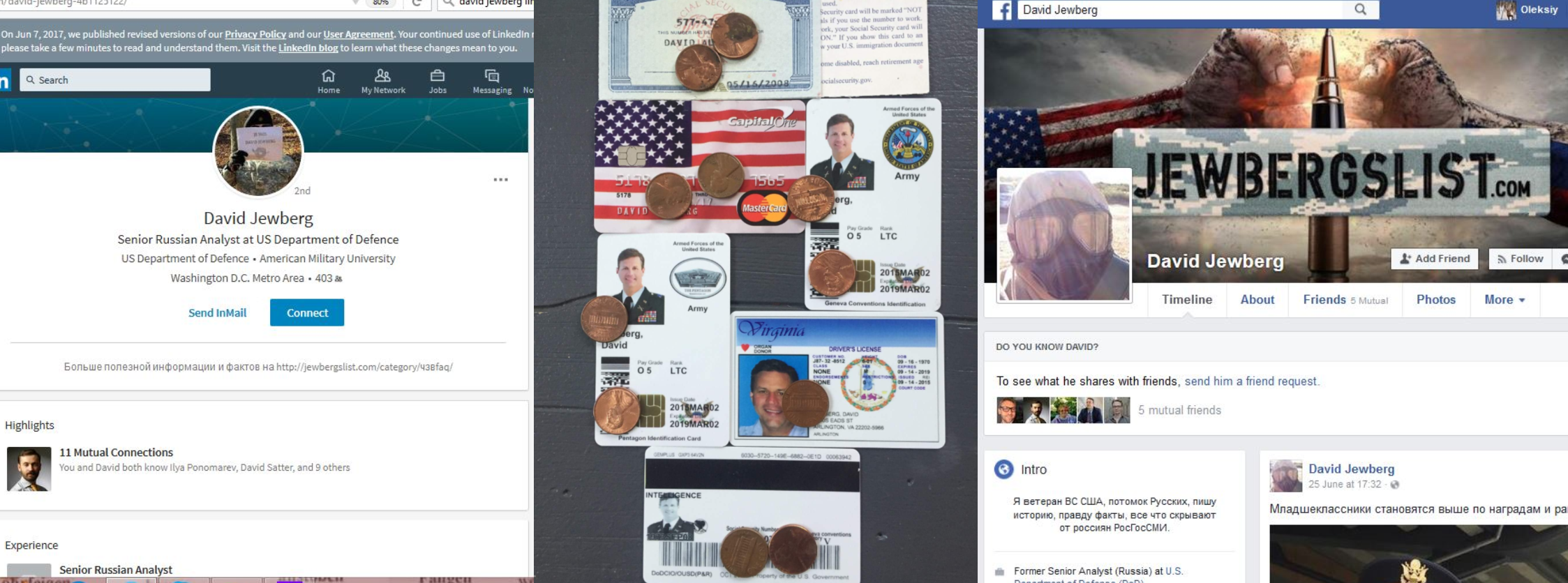#TrollTracker: David Jewberg, A Bellingcat Investigation
The curious case of David Jewberg, the fake senior Pentagon Russiaanalyst
#TrollTracker: David Jewberg, A Bellingcat Investigation

The curious case of David Jewberg, the fake senior Pentagon Russia analyst

*Editor’s Note: This article was produced and written by @DFRLab’s institutional partners at Bellingcat. You can read the entire piece here.
The following is a collection of excerpts from Bellingcat’s recent investigation into the false identity of “David Jewberg” created by American financier Dan Rapoport. There are many ways to fight disinformation, the following details a series of escalatory measures that essentially fought content with more content. In an information environment already polluted with disinformation, @DFRLab questions the efficacy of adding more non-objective content into the ecosystem.
The details of the case:
Though the last name “Jewberg” is a satirical name to use, this was not the tone taken by the Facebook page and Ukrainian media coverage of the “Pentagon insider.” For example, Jewberg has shared a series of identification cards showing his identity, though the first three letters of his last name are not visible in any of the IDs.
However, the man in these photographs is not actually “David Jewberg,” but a Texan named Steve Ferro. As described later in this investigation, Ferro is a college friend of Dan K. Rapoport.
Brash to the point of being offensive and in equal parts anti-Putin and patriotic to America, David Jewberg was just the kind of an American many in the Russian opposition craved.
It is evident that the Russian opposition figures and Washington-area individuals who were aware of Jewberg’s “status” were either used to prop up or actively participated in maintaining the credibility of an imagined Pentagon official.
Natalia Arno, the President of the Free Russia Foundation, spoke to Bellingcat and stated that she was aware that Dan Rapoport operated the David Jewberg account, and that this was an open secret among many in Russian anti-Putin circles in Washington.
It is clear that in 2015, a fictitious persona named “David Jewberg” was invented to publish analysis on Russia and Ukraine from an insider’s perspective, in this case from the Pentagon. It is also clear that Dan Rapoport and his social circles are at the nexus of the materials surrounding the Jewberg persona, including the face used to depict him and Jewberg’s “friends” in the Washington area. However, what is not clear is why persona was invented with a ridiculous last name, using the face of a man in Texas.
On implications for disinformation:
In 2015 and 2016, at the heights of Russia’s propaganda operation against Ukraine and the West, many wondered what measures could be taken to counter disinformation efforts. Some answers came in so-called “anti-disinformation centers,” such as EU vs. Disinformation and StopFake. Others looked to increase the standards of independent investigative reporting to reduce the allure of disinformation and so-called “fake news”, as seen in a number of grants from Western nations to Ukrainian news outlets, such as Hromadske. At Bellingcat, we have sought to provide a combination of pedagogical resources to know how to verify information, along with transparent, open source investigations that open up the research process to our readers.
There is much debate about the efficacy of these types of initiatives; however, all can likely agree that the creation of a fictitious anti-Kremlin Pentagon official is not a productive method of countering disinformation.
Read the full article by Oleksiy Kuzmenko on Bellingcat’s website.
Follow along for more in-depth analysis from our #DigitalSherlocks.

